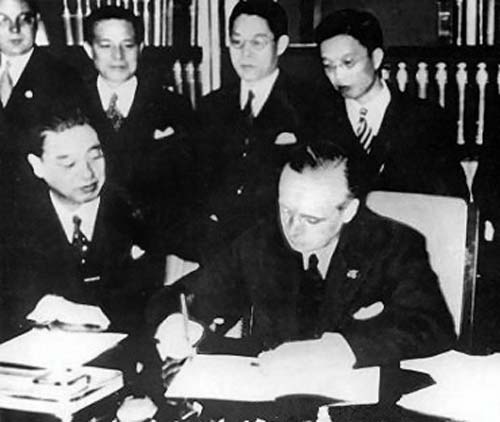 Japanese ambassador Viscount Kintomo
Japanese ambassador Viscount KintomoMushakoji & Hitler’s foreign affairs
adviser Joachim von Ribbentrop
The anti-comintern pact, which was signed on November 25, 1936, was concluded between the Empire of Japan and Nazi Germany. This anti-communist pact was opposed to the ideologies of the Comintern of Communist International. It aims to disintegrate all existing states at its command, as communism tends to endanger the internal peace of nations, as well as their social well-being. Hence, the concept behind communism tends to become a threat to world peace because of the subversive activities involved in it.
History of the Anti-Comintern Pact
The beginnings of this pact go back to 1935, the time when several German officials were attempting to create a balance in the competing demands placed on the Reich’s foreign policy with its alliance with China, as opposed to Hitler’s desire to foster a relationship with Japan. It was in October 1935 when the idea of creating an anti-communist party can tie in the powerful Kuomintang regime. The concept appealed to Ambassador Joachim von Ribbentrop, as well as General Oshima Hiroshi, as they aimed for an alliance that could lead to China’s dependence to Japan.
However, the lack of interest of the Chinese people tend to doom the project’s main purpose, although Hiroshi and Ribbentrop has already formulated a treaty that was anti the Comintern. Originally, the pact was intended to be introduced during the last quarter of 1935, and several countries were invited to join such as China, Italy, Poland and Britain. There were concerns about the pact, though, since it might damage the relations between China and Germany. Furthermore, it may cause a political disarray and issues in Tokyo, after the military coup that occurred in 1936. Because of the failed rebellion, the pact was shelved for one year.
During mid-1936, there was an increase in the influence of military officials in the government of Japan. This situation caused Tokyo and Berlin to be concerned about the existing Soviet-Franco alliance. Moreover, Hitler’s aspirations for an anti-communist policy may lead to the revival of the anti-comintern pact. Hence, the pact was recreated on October 23, 1936, and it was signed the following month. To prevent negative impacts in the relations with the Soviet Union, this pact was to be directed against the Comintern, although it included an agreement that in case the signatory power has become involved in a battle with the Soviet Union, the other signatory would be obliged to maintain neutrality.
In case Soviet Union has decided to attack Japan or Germany, these two countries would come up with a certain measure that would protect their common interest. These countries also agreed that they would not become involved in political treaties or pacts with the Soviet Union. In addition, Germany agreed to recognize the ideals of Manchukuo.
The Beginnings of the Axis Powers
Italy joined the agreement on November 6, 1937, and this eventually formed the group called the Axis Powers. The decision of Italy to become a part of the pact was believed to be the consequence of the Stresa Front that was a total failure. It was the Franco-British initiative that was meant to prevent Nazi Germany from going beyond the existing borders. Both nations aimed to put an end to Germany’s expansions, particularly the annexation of Austria. Eventually, Italy succeeded in invading Ethiopia in October of 1935, and this was against the policy in the League of Nations.
In the early days of June 1935, the Anglo-German Naval Agreement was created, and it was signed by Nazi Germany and the United Kingdom. This pact marked the start of Hitler’s attempts to improve the relationship between the two nations, and to isolate completely the Soviet Union. However, Britain and Soviet Union was also trying to do the same thing in isolating Germany. Afterwards, Hitler succeeded in influencing the Poles to become a part of the Anti-Comintern pact, and he expressed his goals of settling the territorial disputes that existed between Germany and Poland.
Unfortunately, Poland did not agree to Germany’s terms, as it feared of an alliance that might make Poland as the puppet state of Germany. During that time, several Japanese officials were surprised about the Anglo-German naval pact, yet the military officials that were in control during that time were convinced that it was a ruse meant to give the Nazis some time to improve their navy. They still continued to plot battle against the Western democracies or the Soviet Union, with the assumption that Germany would act against these countries. In addition, Hitler’s goals to develop and strengthen relations with Britain eventually failed.